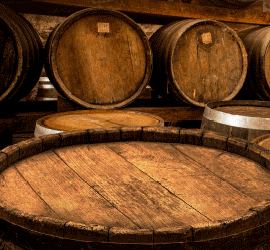According to the latest statistical report by the International Organisation for Vine and Wine, which has supported the World Bulk Wine Exhibition since its inception, the share of bulk wines in international wine exports rose from 33.9 percent in 2000 to 37.8 percent in 2012. Suppliers have been quick to latch on to the potential offered by the expansion of bulk consignments, not least of which are those located in one of the world’s largest wine producing regions, Languedoc-Roussillon, reports La Journee Vinicole.
“Historically, we are known as a region of bulk shippers”, says Italo Pitis, managing director of Coop de France Languedoc-Roussillon. Although the share of bottled shipments has risen dramatically in recent times, the capacity to supply substantial volumes of bulk wines is still one of the region’s fortes, particularly its co-operative wineries. Hence the decision by several co-operatives to take a regional stand at the World Bulk Wine Exhibition in Amsterdam last November. “Our participation stemmed from a desire to respond to a market segment that is increasingly becoming a focal point for the industry,” explains Italo Pitis. “All market players have realised that this segment is expanding. It may be an overstatement to say there is a global imbalance between supply and demand but undoubtedly buyers are looking to secure procurements”.
Twice as many participants in 2013
Eight co-operatives from Languedoc-Roussillon took part in the exhibition in 2012 under a collective banner. “The co-operatives that took part were delighted, not because of the immediate economic impact – we all know that that is not how wine shows work – but because the quality of their wines was recognised by the buyers who attended”. Buoyed by the success of the event, twice as many co-operatives are due to take part in this year’s show on November 25 and 26 in the Dutch capital. “Our ambition was to increase our presence significantly. The number of exhibiting co-operatives is doubling this year and I hope that in the future we will see further increases”.
Clearly-defined range
The WBWE is part of an ongoing strategic planning process amongst the region’s co-operative wineries. “We aim not only to expand our presence in bulk wine segments but also in export markets in general and the WBWE is one of the routes we believe will take us to these markets”. Of the four working groups set up by Coop de France one is dedicated entirely to expanding exports. “We realised that a joint strategy for developing bottled sales was fairly complicated because each co-op has its own sales strategy,” says Italo Pitis. “For bulk wines, however, we have the capacity to supply a clearly-defined range of wines offering both diversity and volumes. We are looking to expand exports not so much for each individual winery but region-wide. We believe the WBWE can help us gain greater visibility and clout in the marketplace and the show is one of the focal points of our working group”.
Substantial volumes
One of the more visible underlying trends at the show is a tendency for market players to band together to provide larger volume bases for buyers. Is this what buyers are really looking for however? “I think they are, although we will have to wait until the show in November for confirmation of this. When we took part in last year’s event, we realised that some of the calls for tender involved fairly substantial volumes and I think we can respond to those by grouping together. All those involved in the regional wine market in Languedoc-Roussillon have realised that the region has the potential to become one of the world’s leading suppliers of bulk wines. We can offer both the quality and quantity of wines needed”.
Several after-sales options
To further facilitate the task of wine buyers, serious consideration is being given to after-sales services such as logistics solutions. Although Languedoc-Roussillon co-operatives have yet to set up a consolidated logistics platform, they have already been mulling a certain number of ideas. “It is important to remember that although we want to present a united front at the WBWE, each winery still has its own independent sales strategy. However, for obvious reasons, we are currently studying several options with a view to streamlining access to our wines for buyers. Concurrently with this, the regional council with Sud de France Développement is aiming to establish a shared distribution system for wine growers and the agri-food industry in general. The project’s primary ambition is to facilitate logistics nationwide but it also opens up new prospects for international markets. At Coop de France, we are still in the early stages of strategic planning but we are certainly giving careful thought to collaborative solutions for logistics”.
A broad range of wines
In the meantime, Co-op de France LR is finalising details of its attendance at the 2013 WBWE. One of the main objectives will be to showcase the extensive range of wines the region has to offer. “We want to show that although we are participating as a single region, we can offer a very comprehensive, clear range of wines for the bulk market. We are putting the finishing touches to the selection we will be showcasing in Amsterdam. Obviously some areas are more geared to the bulk wine market than others but we will be presenting a large cross-section of what the region has to offer”. It is too early to predict how the bulk wine market will trend over the coming financial year but initial signs are encouraging and Languedoc-Roussillon co-operatives are confident that they can benefit from growth. “The bulk wine market is one area where we have the potential to become market leaders. I think bulk sales can provide a real boost to our regional economy and local businesses,” says the director of Co-op de France LR.
France as a whole is a major exhibitor at the WBWE and several producer regions have confirmed they will be exhibiting again this year. For Blandine Philibert-Maret, WBWE’s managing director for France, the trend highlights the show’s increased international scope with participants coming from a broad range of producer countries across the globe: Australia, South Africa, Chile, Argentina, Uruguay, the United States, Spain, Italy, Portugal, Greece and of course, France. As the choice of supplier countries broadens, so too does the number of international buyers looking for quality bulk wines.




















